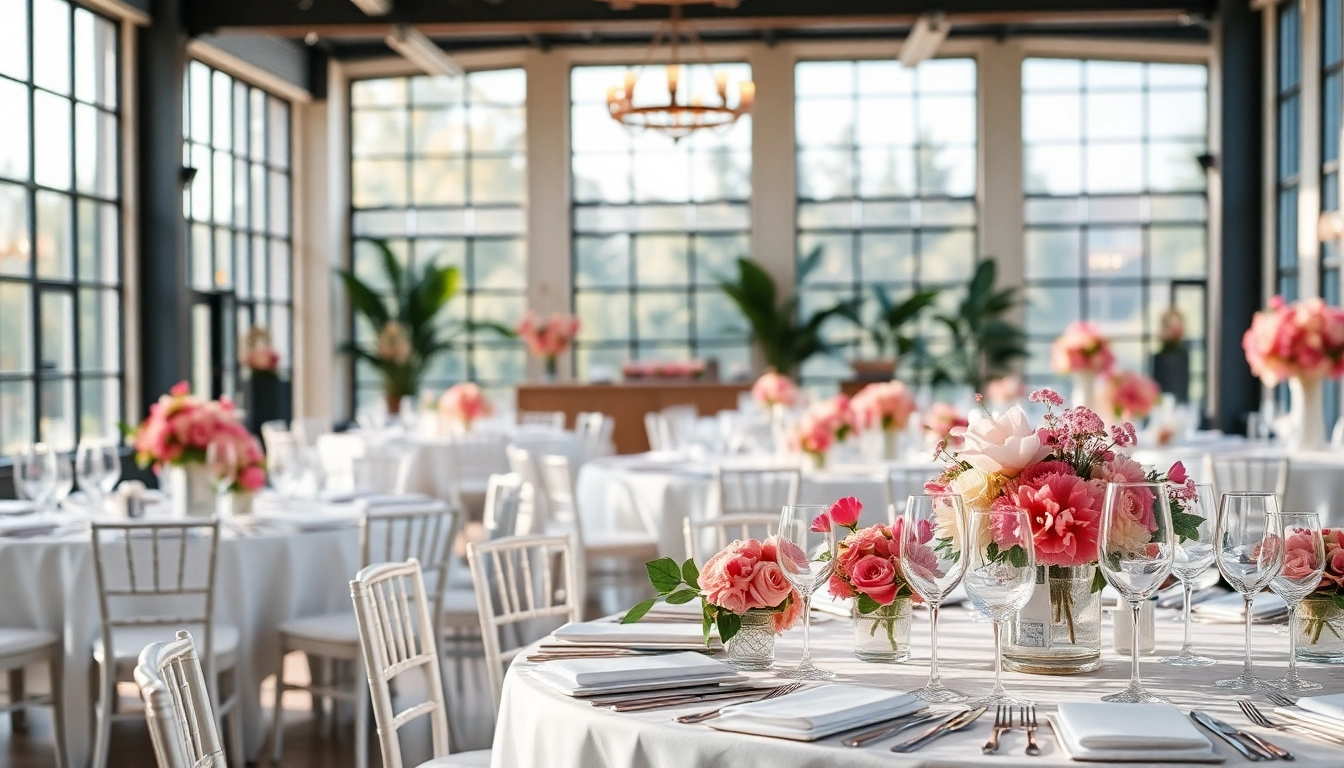Understanding Your Event Space Needs
Choosing the right event space is critical for the success of any gathering, be it a wedding, corporate event, workshop, or social celebration. To make a well-informed decision, it’s essential to understand your specific requirements and preferences. A careful assessment of elements such as capacity, purpose, and budget will lay the groundwork for a successful event.
Assessing Capacity Requirements
The first step in determining the ideal event space is to assess the capacity requirements. This involves estimating the number of guests that will attend your event. A space that is too small can create a cramped, uncomfortable atmosphere, while an excessively large venue may feel empty, diminishing the event’s energy and engagement.
Start by creating a guest list. Be as precise as possible, taking into account people who may RSVP yes, no, or maybes. Depending on your event, consider adding a buffer for last-minute additions. Once you have an estimate, look for spaces that can comfortably accommodate your group, keeping in mind any additional considerations such as seating arrangements, staging, and traffic flow.
Defining Your Event’s Purpose
Each event has a unique purpose, which will significantly influence your choice of event space. Are you hosting a formal corporate meeting, a celebratory wedding reception, or an informal networking event? Understanding the primary goal and tone will help guide your selection process.
For example, a high-stakes business meeting may require a space equipped with technology for presentations, while a wedding would benefit from scenic backdrops and decoration options. Clarifying the purpose will assist you in narrowing down venues that align with your vision and objectives.
Budgeting for an Event Space
Budget considerations are critical when selecting an event space. It’s important to set a clear budget that reflects the maximum you are willing to spend on the venue. This budget should encompass all costs related to the space, including rental fees, security deposits, setup fees, and any necessary additional services such as catering or audiovisual equipment.
Be realistic with your budget. Ensure it aligns with your overall event budget and takes into account potential unforeseen expenses. Researching various venues and obtaining detailed quotes can provide you with a clearer understanding of what you can afford and help you steer clear of hidden costs that can add up quickly.
Types of Event Spaces Available
With a plethora of options, understanding the types of available event space can aid in selecting the right venue that suits your specific needs and adds value to your gathering.
Indoor vs. Outdoor Event Space
When deciding on a venue, you’ll encounter a fundamental choice between indoor and outdoor settings. Each comes with distinct advantages and considerations.
Indoor venues are particularly advantageous for events requiring controlled environments, protection from the elements, and convenience in terms of facilities. They generally come equipped with amenities such as climate control, sound systems, and lighting that can be tailored to enhance the event atmosphere.
Conversely, outdoor event spaces offer a unique charm and scenic beauty that can create unforgettable experiences. Nature’s backdrop can enhance the ambiance significantly but comes with its own challenges, such as weather unpredictability. It’s vital to have contingency plans in place, such as tents or indoor alternatives, should the weather take a turn.
Unique Venues for Memorable Experiences
Choosing a unique venue can elevate your event, making it more memorable for attendees. Instead of traditional spaces like banquet halls or conference centers, consider options such as art galleries, historic landmarks, or unconventional spaces such as warehouses and rooftops.
Seek venues that resonate with your event’s theme or purpose. For example, a tech conference may thrive in a modern art gallery, while a romantic wedding could be beautifully suited to a garden or vineyard setting. Unique venues often offer inherent decoration and atmosphere, requiring minimal additional enhancement.
Flexible Spaces for Various Events
In recent years, flexible spaces have gained popularity due to their versatility. These venues can accommodate a wide range of events, from corporate meetings to casual gatherings, allowing you to tailor the space to fit various configurations and requirements.
When exploring flexible venues, inquire about facilities such as movable partitions, adjustable seating arrangements, and amenity options like staging or audiovisual technology. The adaptability of a venue can be a significant advantage, particularly if you have multiple activities or sessions planned throughout your event.
Key Features to Look for in an Event Space
Finding the right event space requires not just assessing the space itself but also identifying key features that will enhance the overall experience. Below are critical aspects to consider.
Amenities That Enhance Your Event Experience
A thorough evaluation of the amenities provided by a venue can help ensure that all aspects of your event run smoothly. Amenities may include aspects such as seating, catering facilities, restrooms, parking, and decor options.
Consider the requirements specific to your event when assessing amenities. For instance, if multimedia presentations are necessary, ensure the venue has state-of-the-art audio-visual equipment. Furthermore, practical aspects like wifi availability and access to power outlets for charging devices cannot be overlooked.
Accessibility and Location Considerations
The location of your event space is another significant factor that can influence attendance and overall experience. It should be easily accessible for all your guests, factoring in proximity to public transport and parking facilities.
Also, consider the surrounding area—venues located in vibrant neighborhoods may offer added value, such as dining and entertainment options for guests before or after your event. Assess the safety and convenience of the location as well, ensuring a welcoming environment for all attendees.
Technological Facilities for Modern Events
As technology is increasingly integrated into events, it is vital to evaluate the technological capabilities of your chosen event space. Features may include high-speed internet access, video conferencing facilities, projection equipment, and advanced lighting systems.
When possible, conduct a test run of any technology you plan to utilize ahead of time. This can help identify any potential issues and allow you to assess technical support available from the venue’s staff.
Strategies for Booking Your Event Space
Securing the right event space requires strategic planning and organization. Follow these strategies to make the booking process smoother.
Effective Research Techniques
When searching for venues, be thorough in your research. Utilize online platforms and resources to generate a list of potential spaces. Pay attention to reviews, ratings, and detailed descriptions. It can also be beneficial to seek recommendations from colleagues or industry peers who may have experienced successful events in specific locations.
Once you have narrowed down your options, create a pros and cons list for each venue to clarify which aspects are most critical for your event. This exercise not only streamlines the selection process but also highlights venues that best meet your criteria.
Negotiation Tips for Securing the Best Deal
Once you have identified potential venues, it’s time to engage in negotiations. Approach this phase with awareness of your budget, and be prepared to articulate your needs clearly. Venue managers appreciate transparency and will often work to accommodate requests that align with available resources.
Don’t hesitate to ask questions regarding pricing structures, hidden fees, or bundle deals for ancillary services. Being proactive in negotiating can result in discounted rates or added services, enhancing the overall value of your chosen venue.
Understanding Rental Contracts and Policies
Before finalizing any agreement, ensure that you thoroughly review the rental contract. Pay special attention to details such as payment terms, cancellation policies, deposit requirements, and liability clauses.
If any aspects are unclear, do not hesitate to seek clarification from the venue owner or manager. Understanding and agreeing on all terms in advance will help prevent any misunderstandings and ensure a smooth event-day experience.
Making the Most of Your Event Space
With the venue secured, the focus shifts to maximizing the potential of your chosen event space to create an impactful experience for your guests.
Designing the Layout for Engagement
The layout of your event space can significantly influence guest interaction and engagement. Consider how you want participants to flow and interact with each other in the space. For meetings or conferences, an arrangement that facilitates interaction, such as U-shape or theater style, can be effective.
Don’t forget to account for pathways to avoid bottlenecks and ensure accessibility. Informing the venue staff about your layout design preferences can help them facilitate setup according to your needs.
Enhancing Ambiance with Decor
Deciding on decor is an integral part of creating the desired ambiance for your event. Personal touches can transform a space and reinforce your event’s theme or mission. Think about elements such as color schemes, lighting, floral arrangements, and signage that reflect the event’s character.
Consider unique decorative items that may add a personal flair, or utilize the space’s existing aesthetic features to enhance your decor. Collaborating with a professional decorator who understands your vision can help bring your ideas to life effectively.
Ensuring a Smooth Flow of Activities
Planning the sequence of activities is essential to maintaining engagement and managing time efficiently throughout your event. Whether it involves creating a detailed timeline for presentations or scheduling breaks between sessions, clarity is crucial.
Share the finalized agenda with the venue staff to ensure they can assist in setting up necessary visual aids and audio-visual equipment seamlessly. Having dedicated individuals managing the schedule will ensure a smooth flow of activities and minimize disruptions.



